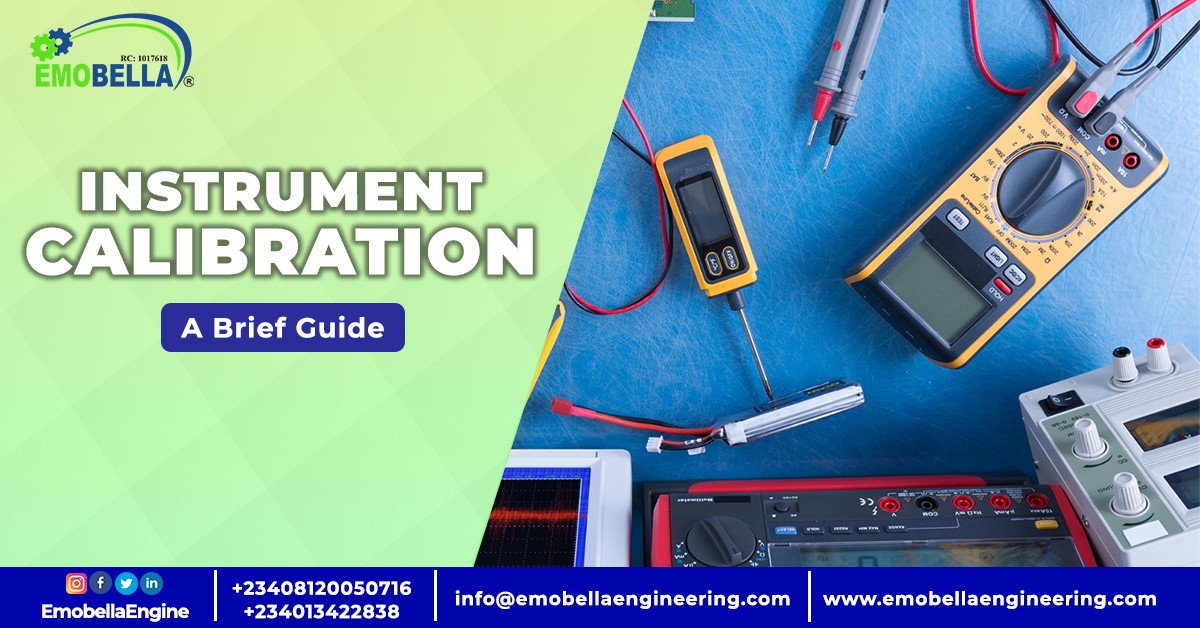
Instrument Calibration – A Brief Guide
What is instrument calibration?
Calibration is the process of testing or restoring the accuracy of an instrument or measuring equipment by comparing it with an established standard to ensure that it is operating safely and efficiently.
Once calibration is completed the values at every point of reference of the equipment is then calibrated and the standard calibration equipment must match or be within allowed tolerance/accuracy percentage for that equipment to be certified okay.
But if there’s a deviation the due adjustment, correction, reset, or repair is carried out on the equipment by the instrumentation engineer to reset the equipment to it’s normal or expected standard.
Basically, instrument calibration ensures that organisations (food processing, environmental, oil and gas, etc) are able to prevent inaccurate readings in their processes, thereby ensuring that the instruments continue to meet its manufacturers specifications and specified purpose.
Why is calibration required?
From the above explanation, we now understand that reliable calibration services are essential for production quality. However, sometimes we get questions like “why is calibration required?”, “is it even needed?” whenever we work with or visit some of our clients.
Based on this, we thought it’d be great to list some reasons why calibration is important and vital to your production quality.
- Calibration is required for a new instrument to ensure that it is working properly and according to specified standard.
- Calibration is required when the instrument has been exposed to adverse conditions, turbulent processes, etc.
- Calibration is also required after an instrument has been repaired or modified
- After the specified usage time has elapsed
- Calibration is also a statutory requirement according to the international and local standards
How is calibration done?
When considering how calibration is done, it is important to note that each type of instrument have their own calibration method and process. However, there are general basic steps which must be taken into consideration before commencement of calibration. Let's go over these steps below:
Step 1
Identify the type of instrument you’re calibrating, e.g., Is it a pressure or temperature related instrument?
Step 2
Choose the right calibration instrument that can check within the range of the instrument to be calibrated.
Step 3
Set up your calibrating environment.
Step 4
Ensure that every instrument you’re calibrating is properly connected to the calibrator. This will help avert inaccuracies in your readings and prevent you from noting wrong observations.
Step 5
Now, you perform the calibration. It is however, advised to perform the calibration 2 – 3 times. This is known as “iteration;” done to ensure your readings are accurate. Always do this even if you get the right result the first time.
Step 6
Note down your readings and calculate if there are any deviations. If there are, check to see if it is within the acceptable deviation of that equipment. If it’s not within the acceptable deviation of that particular equipment, that equipment did not pass that calibration. From the result, recommendations can be given accordingly.
Calibration instruments list
Here’s a list of some of the calibration instruments that are popularly used:
- Dead weight tester
- Loop calibrator
- Comparison pump
- Multimeter
- Temperature bath
- Test flange
- Test bench
What instruments require calibration?
Every instrument that takes measurement needs to be calibrated at some point. Some examples of instruments that require calibration include scales, speedometers, thermometers, flow meters, temperature probes, etc.
What is the importance of instrument calibration?
- Calibration will help extend the life of your instruments
- The performance of your instrument will be enhanced
- Reliable readings and results will be achieved and maintained
- Instrument calibration helps your facility be more efficient and productive, saving you money and time
Truth is, the accuracy of almost every instrument will begin to deviate over time due to harsh operating conditions, exposure to extreme conditions, mechanical shocks, etc.
And because it is not uncommon for instruments to deviate from pre-set settings, such deviations need to be corrected ahead of time before they affect the quality of the final product.
For example, the impact of a turbulent force on a pressure gauge can make the pressure gauge deviate from its pre-set settings, making it give a wrong reading. Calibration will help ensure that the pressure gauge in operation provide matching results and any bias or deviation is eliminated.
How often should instrument calibration be done?
How often should instrument calibration be done is also another question we get asked a lot. And we know it’d be nice to have a simple answer, but the truth is it’s not that simple as it mostly depends on usage.
If your company does critical measurements, then a shorter timespan between calibrations like monthly, quarterly, or semi-annually will afford you better readings.
If your company does a mix of critical and less critical measurements, annual calibration will be the best option for you.
Irrespective of the process and conditions, it is a statutory requirement that all process instruments must be calibrated annually or biannually.
How can Emobella Engineering help in terms of calibration?
The importance of instrument calibration cannot be over-emphasized as it is a vital maintenance requirement that must never be skipped by any organisation that uses instruments and machinery.
Emobella Engineering Nig. Ltd. has a team of competent personnel ready to solve your calibration needs to help protect your business from unexpected downtime and sudden equipment failure.
Have any comments or questions? Please take a moment to contact us or request a quote for your calibration needs today.
CEO Emobella Engineering | CEO RapidFreight and logistics Ltd| Founder, Institute of Industrial Development | Humanitarian | Public Speaker
1yGetting the best out of your process plant requires you to have working process calibration plan for all your field devices. We Emobella Engineering Nigeria Limited are your one stop shop for your temperature and pressure transmitter, flowmeter #calibration #instrumentation #engineering